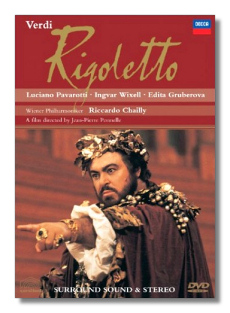
The Internet's Premier Classical Music Source
Related Links
- Verdi Reviews
- Latest Reviews
- More Reviews
-
By Composer
-
Collections
DVD & Blu-ray
Books
Concert Reviews
Articles/Interviews
Software
Audio
Search Amazon
Recommended Links
Site News
 DVD Review
DVD Review
Giuseppe Verdi

Rigoletto
- Luciano Pavarotti
- Edita Gruberová
- Ingvar Wixell
- Victoria Vergara
- Ferruccio Furlanetto
Jan-Pierre Ponnelle, director
Vienna Philharmonic Orchestra/Riccardo Chailly
Unitel/Decca 071501 DVD 275' Dolby Digital 5.1
The release of a DVD of an opera filmed on location is always an event. They nearly always have excellent production values and rarely contain intrusive ticks like audience applause and stage noise. This recording of the 1983 Unitel German production of Rigoletto is both wondrous and consistently excellent. So what if the singing is post-dubbed? The effect is still entrancing.
Rigoletto was controversial in its day because its theme, the attempted murder of a duke by a subject, was just too dark. This recording captures the rage of Rigoletto, not just against the duke but the whole court who used and mocked him at the same time. Ingvar Wixell manages to elicit sympathy and revulsion at the same time. And it is a revulsion at his collaboration with court intrigue, not his appearance. His "Cortigiani, vil razza dannata" has undeniable poignancy: it arcs from rage to pleading with heart stopping drama. Ponnelle's direction is first rate. Rigoletto's first scene with the cutthroat Sparafucile, while not particularly musical, creeps up on you with dark and sinister tones. Gilda's rendition of the famous "Cara nome," itself a small masterpiece, features a compelling blend of long shots and close-ups. As the great leering duke who "loathes fidelity like the plague" (only to chide women for their inconstancy in the great aria "La Donna e mobile"), Pavarotti delivers one of the great roles of his career.
Some viewers may not respond as warmly as I did over his creative effects, such as when the courtiers are singing and the camera follows the staccato tutti chords with quick face shots. Ponnelle opens the first act overture with a extra-diagetic scene of Rigoletto encountering the corpse of his daughter, as if in a dream. The brief trio between Sparafusile, Maddalena, and Gilda, shot beneath flashing lightning, veers close to melodrama's precipice. Patience gentle viewers! These may be daring dramatic effects, but this is grand opera! They all should be permitted, just as long as we don't expect them all to work.
Copyright © 2002, Peter Bates


















